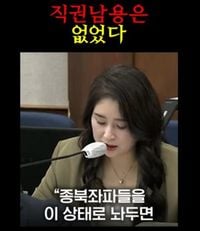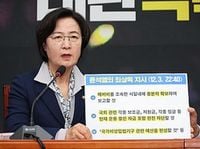South Korea’s political and legal landscape has once again been thrust into the spotlight, as a high-profile dispute involving former President Yoon Suk-yeol, his legal team, and several prominent political figures continues to unfold. The controversy, which centers on the declaration of martial law on December 3, 2024, and subsequent accusations of abuse of power, has sparked a fierce debate over constitutional procedures, legal rights, and the boundaries of political discourse. As the dust refuses to settle, the nation watches closely, wondering where this saga will lead next.
The latest salvo in this ongoing drama was fired on October 8, 2025, when attorney Kim Gaeri, a member of Yoon’s defense team, took to his YouTube channel, ‘Kim Gaeri TV,’ to address the mounting accusations against the former president. According to Kim, claims that Yoon’s declaration of martial law amounted to an abuse of power are unfounded. "There was no abuse of authority in the martial law declaration," Kim insisted, as reported by Freezine News. He argued that Yoon’s actions did not violate the law and that the procedures followed were in strict accordance with South Korea’s constitution.
Kim Gaeri’s defense focused on the procedural aspects of the December 3, 2024, cabinet meeting, which has become a flashpoint in the controversy. He pointed out that the prosecution has accused Yoon of obstructing cabinet ministers from exercising their right to deliberate by not waiting for all members to arrive before convening the meeting. However, Kim countered that the indictment itself details how Yoon actively convened the cabinet and engaged in heated debate with attending ministers. "The indictment actually states that the defendant actively convened the cabinet meeting and engaged in passionate discussion," Kim said, referencing the official documents.
According to the indictment, Yoon personally or through his presidential aides instructed Prime Minister Han Deok-soo and other cabinet members, as well as National Intelligence Service Director Cho Tae-yong, to attend the meeting at the presidential office. The record indicates that for about an hour and forty minutes, key officials such as Prime Minister Han, Foreign Minister Cho Tae-yeol, and Deputy Prime Minister and Finance Minister Choi Sang-mok voiced their opinions vigorously, with Yoon responding in kind.
During the meeting, Yoon reportedly remarked, “If we leave the pro-North leftists as they are, the country will be ruined. The cabinet ministers’ perception of the situation is different from that of the president.” He also handed Foreign Minister Cho a document instructing him to stabilize foreign relations through overseas missions. Kim Gaeri argued that these actions demonstrated Yoon’s commitment to due process. Once the required quorum of eleven cabinet members was present, Yoon declared, as displayed in subtitles on Kim’s broadcast, "The ministers see the situation differently than I do as president. This is a decision I have made as president, and I take responsibility for it. I have no choice but to declare martial law now. The cabinet has deliberated, and since I have to make the announcement, I am leaving."
Kim Gaeri maintained that this sequence of events showed Yoon followed both the letter and spirit of constitutional procedure. He stated that declaring martial law after fulfilling the quorum and deliberation requirements was an exercise of presidential authority, not an abuse of power. "It is difficult to see this as an abuse of authority from a legal standpoint," Kim concluded, asserting that the prosecution’s case is weak.
But the legal wrangling did not end there. On October 12, 2025, the dispute took another turn as Kim Yong-hyun, the former Defense Minister and a central figure in the martial law controversy, announced plans to sue lawmaker Choo Mi-ae of the Democratic Party for defamation and damages totaling over three billion won. According to reporting by Freezine News, Kim’s legal team distributed a statement to the press, stating, “Choo Mi-ae continues to undermine Kim’s reputation by making false claims about his obsession with retirement benefits.” The statement also accused Choo of a pattern of harassment, declaring, “Choo Mi-ae persists in her stalking behavior...she should look at herself in the mirror.”
The animosity between Kim Yong-hyun and Choo Mi-ae has intensified over allegations that Kim filed for his retirement pay immediately after the declaration of martial law. Choo, a member of the National Assembly’s Special Committee on the Investigation of the Rebellion Allegations, publicly questioned Kim’s motives, asking, “How could Kim Yong-hyun, who was imprisoned over the rebellion incident, have the audacity to apply for retirement pay?” She also cited testimony from Defense Ministry officials that Kim had expressed a desire to “slap Choo Mi-ae,” a claim that Kim’s team has denied and labeled as defamatory.
Kim’s legal representatives argued that Choo’s remarks were not only personally damaging but part of a broader campaign by the Democratic Party to discredit the former president and his allies. They accused the party of “playing a rebellion game” against Yoon and claimed that Choo was performing an important role in this alleged campaign. The statement further criticized the Democratic Party’s handling of the controversy, suggesting that the party was more interested in silencing dissent through “KakaoTalk censorship and intimidation” than in addressing public concerns over the investigation into Choo’s son’s alleged preferential treatment.
With the dispute escalating, Kim Yong-hyun’s team announced plans to file a formal complaint for defamation and a civil lawsuit for damages at the Seoul Central District Court. They emphasized that all of Choo Mi-ae’s statements and actions would be included in the complaint, signaling that the legal battle could drag on for years to come.
These legal and political battles have not occurred in a vacuum. For three years, the dispute surrounding the December 2024 martial law declaration has played out in the public eye, with accusations of unauthorized use of rights, misrepresentation, and legal maneuvering dominating headlines. The conflict has involved not only Yoon Suk-yeol and Kim Yong-hyun but also national assembly members and other public officials, turning what began as a legal question into a full-blown political spectacle.
As the nation’s attention remains fixed on the unfolding courtroom drama, many wonder what the long-term implications will be for South Korea’s political system and the rule of law. The stakes are high, with reputations, careers, and even the integrity of the country’s democratic institutions hanging in the balance. For now, the only certainty is that the debate over presidential power, legal responsibility, and political accountability is far from over.
In the midst of heated rhetoric and legal filings, the story of Yoon Suk-yeol, Kim Yong-hyun, and their political adversaries continues to captivate and divide South Korea, offering a stark reminder of the challenges that come with leadership, dissent, and the pursuit of justice in a democracy.


